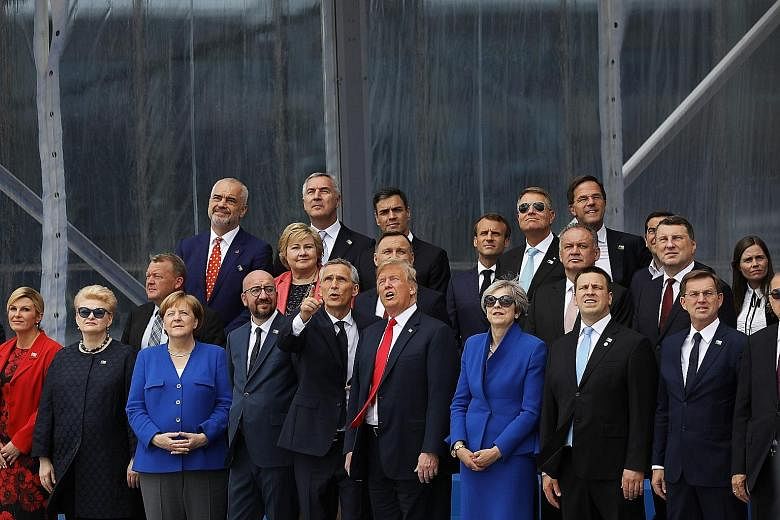BRUSSELS • After two days of haphazard deal making with European allies over military spending and throwing some of his closest diplomatic relationships into disarray, President Donald Trump pledged that the United States commitment to Nato "remains very strong" and that his allies had agreed to increase levels of military spending "like they never have before".
Mr Trump, speaking at an impromptu news conference at Nato headquarters in Brussels yesterday after he ignited a crisis behind closed doors over burden-sharing within the alliance, dismissed any concern that his relationship with Russia was too cosy or that his approach to his allies was too harsh.
Hailing himself, again, as a "stable genius", he took "total credit" for persuading his allies to increase military spending beyond established markers - a claim that was nearly immediately undercut by at least one European leader.
Mr Trump spoke for more than a half-hour while flanked by Secretary of State Mike Pompeo and Mr John Bolton, his national security adviser.
"I told people I'd be very unhappy if they didn't up their commitments very substantially," said Mr Trump.
He griped that the US shouldered "probably 90 per cent of the cost of Nato" - the number is actually closer to 67 per cent of all military spending of the Western defence alliance, but that includes global spending, not just Europe.
The US pays 22 per cent of the Nato budget itself.
According to the International Institute for Strategic Studies, of the US$603 billion (S$821.4 billion) the US spends on defence, only about US$31 billion goes to Europe.
Nato members have pledged to aim to spend at least 2 per cent of gross domestic product on military spending by 2024, but Mr Trump, after berating alliance countries for failing to meet a target that they were not obligated to meet for six more years, then abruptly said on Wednesday night the figure should be 4 per cent of GDP. That, he said, was closer to the correct number.
French President Emmanuel Macron rejected Mr Trump's assertion that Nato states had agreed to anything that was not already in place.
"A communique was issued yesterday," Mr Macron said. "It reaffirms the 2 per cent by 2024 commitments. That's all."
He said Mr Trump had, contrary to reports, never told his fellow leaders that the US could withdraw from the alliance.
German Chancellor Angela Merkel told reporters "we had a very intense summit", but added that in the end, everyone had made a clear commitment to Nato.
Nato secretary-general Jens Stoltenberg told CNN that member countries have committed to defence spending at 2 per cent of GDP, but would not confirm Mr Trump's claim that the target was 4 per cent.
Mr Trump had opened the first day of talks in Brussels on Wednesday with a public diatribe against Germany, the second-biggest state in Nato, criticising its reliance on Russian gas imports and failure to spend more on defence.
The mood had appeared to have calmed as the summit went into its second day yesterday, focusing on operations beyond Europe. But, several sources said, Mr Trump instead reopened in strong terms his demand that other countries spend more immediately.
The US President yesterday also answered several questions about his meeting with Russian President Vladimir Putin, scheduled for Monday in Helsinki.
Mr Trump said he would discuss violations to a treaty on nuclear weapons, as well as possibly stopping military exercises in the Baltics, but he evaded a question about whether he would recognise Russia's annexation of Crimea in 2014.
He referred to Mr Putin as a "competitor", not an enemy or friend, and tried to wave off expectations that their meeting would result in a substantive policy outcome.
When asked if Russia presented a security threat, Mr Trump offered a grudging compliment: "Hey, I don't want him to be. And I guess that's why we have Nato."
NYTIMES, REUTERS, AGENCE FRANCE-PRESSE
SEE OPINION


